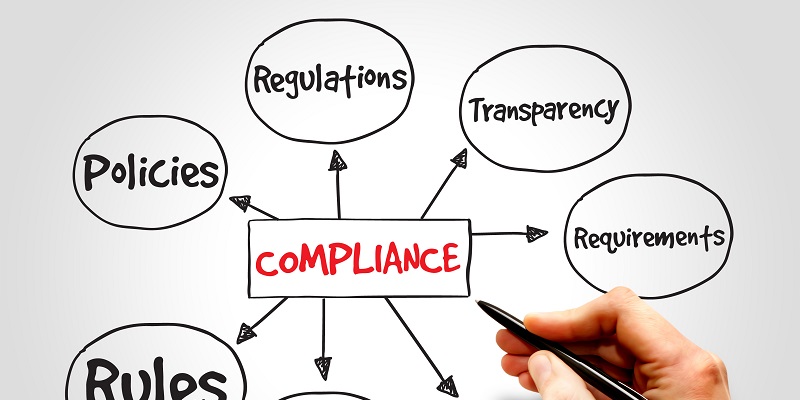Human resources (HR) compliance ensures that the company adheres to all applicable employment laws, regulations, and policies. It is the responsibility of HR personnel to protect both the organization and employees by maintaining strict compliance with all legal obligations. In this article, we will examine the importance of HR compliance, the consequences of non-compliance, the need for confidentiality in HR, technology’s role in maintaining compliance and confidentiality, employee training, regular review and updating of policies and procedures, clear communication of expectations, involvement of legal counsel, and the creation of a culture of compliance and confidentiality.
Consequences of non-compliance
Failure to comply with employment laws can lead to legal consequences including fines and lawsuits. HR departments must stay current on new, evolving, and complex employment regulations and comply with all of them. Failing to comply with laws regarding wage and hour regulations, worker health and safety, equal opportunity, and discrimination can lead to significant financial penalties and legal liabilities. Additionally, non-compliance can damage the company’s reputation resulting in a reduction in customer trust or financial support.
The Need for Confidentiality
Confidentiality is an essential aspect of HR compliance. HR departments handle sensitive employee data, such as Social Security numbers, health records, and performance evaluations. It is crucial to keep this information confidential to protect employees’ privacy and prevent legal issues. Compromising confidential employee information can result in ethical and legal violations. As such, employees must feel secure in knowing that they can trust the HR department to handle their private information carefully.
The Role of Technology in Maintaining Compliance and Confidentiality
One effective method of safeguarding information is through the use of technology in HR departments. For example, cloud-based compliance software allows HR personnel to centralize and manage all employee data securely. This software also enables efficient reporting and instant access to information. Technology can reduce human error and the possibility of cyber attacks. By utilizing technology, HR departments can secure confidential employee information, ensuring its confidentiality while also complying with all applicable laws and regulations.
Employee training
Training employees is an excellent way to ensure compliance with employment laws. HR departments must provide ongoing training on data privacy laws, anti-discrimination policies, and violation reporting procedures. Employees must understand their rights, responsibilities, and the consequences of violating company policies or laws. HR personnel should provide clear and concise communication regarding laws, regulations, and policies. Regular employee training can improve compliance, reduce legal liability, and create an inclusive workplace culture.
Regular Review and Updating of Policies and Procedures
HR policies and procedures must be reviewed and updated regularly to comply with changing laws and regulations. Often, companies implement policies that work for some time, but they can become outdated in the face of new laws or regulations. Therefore, HR departments must keep their policies and procedures up-to-date to comply with new laws and practices. Regular review is also essential to ensure that compliance processes continue to work effectively. If HR departments fail to update their policies and procedures, they run the risk of unknowingly violating laws or causing reputational damage.
Clear communication of expectations
Policies and procedures should be clear and easy to understand. They should outline expectations for employee behavior and how to handle sensitive information. Writing in clear language makes the information more accessible to employees across all levels of the organization. This will help reduce the risk of misunderstandings and misinterpretation of rules. Additionally, clear communication builds trust between employees and the HR department.
Involvement of Legal Counsel
HR departments should involve legal counsel to ensure that processes and policies comply with all applicable laws and regulations. Legal counsel can provide essential support in drafting and reviewing policies, ensuring that HR departments are following the latest laws and best practices. Involving legal counsel can help minimize legal liabilities, prevent legal issues, and provide expert guidance and support.
Creating a Culture of Compliance and Confidentiality
By implementing the measures outlined above, HR departments can create a culture of compliance and confidentiality. A strong culture of compliance communicates an expectation that employees will follow the rules and adhere to regulations while also creating trust between employees and the company. HR departments can communicate the importance of compliance through leadership, employee training, clear communication of policies and procedures, and regular updates to compliance programs.
Staying Up-to-Date with Regulatory Changes
Finally, HR departments should stay up-to-date with regulatory changes to ensure ongoing compliance. Employment laws and regulations evolve and change, and HR departments must stay up-to-date with all changes. HR personnel should monitor and analyze regulations and policies to ensure they comply with any changes. Failure to stay up-to-date will reduce the effectiveness of HR resources, increase legal liability, and negatively impact the organization’s compliance program.
In conclusion, HR compliance ensures that organizations adhere to employment laws, regulations and policies. Non-compliance can have severe consequences, including legal liabilities and reputational damage. Maintaining confidentiality is crucial to protect both the organization and employee sensitive information. Using technology, employee training, regular review and updating of policies and procedures, clear communication, involving legal counsel, creating a culture of compliance, and staying up-to-date are essential steps towards ensuring compliance. By implementing these measures, companies can reduce the risk of violations and create trust between employees and the company.

